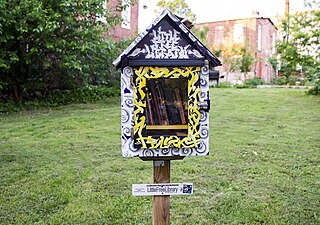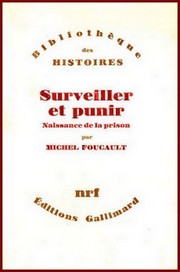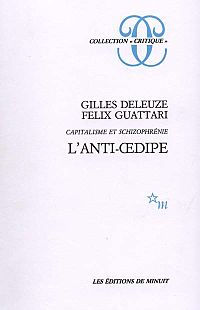Disciplinary institutions (French: institution disciplinaire) is a concept proposed by Michel Foucault in Discipline and Punish (1975). School, prison, barracks, or the hospital are examples of historical disciplinary institutions, all created in their modern form in the 19th century with the Industrial Revolution. Discipline "cannot be identified with any one institution or apparatus," Deleuze explains, "precisely because it is a type of power, a technology, that traverses every kind of apparatus or institution, linking them, prolonging them, and making them converge and function in a new way." [1]
This concept may be related to the concept of "total institution" proposed by Erving Goffman in 1961, as well as to Louis Althusser's Ideological State Apparatuses (ISA).

Pierre-Félix Guattari was a French psychoanalyst, political philosopher, semiotician, social activist, and screenwriter. He co-founded schizoanalysis with Gilles Deleuze, and ecosophy with Arne Næss, and is best known for his literary and philosophical collaborations with Deleuze, most notably Anti-Oedipus (1972) and A Thousand Plateaus (1980), the two volumes of their theoretical work Capitalism and Schizophrenia.

Gilles Louis René Deleuze was a French philosopher who, from the early 1950s until his death in 1995, wrote on philosophy, literature, film, and fine art. His most popular works were the two volumes of Capitalism and Schizophrenia: Anti-Oedipus (1972) and A Thousand Plateaus (1980), both co-written with psychoanalyst Félix Guattari. His metaphysical treatise Difference and Repetition (1968) is considered by many scholars to be his magnum opus.
A subject is a being who has a unique consciousness and/or unique personal experiences, or an entity that has a relationship with another entity that exists outside itself.

Paul-Michel Foucault was a French philosopher, historian of ideas, writer, political activist, and literary critic. Foucault's theories primarily address the relationships between power and knowledge, and how they are used as a form of social control through societal institutions. Though often cited as a structuralist and postmodernist, Foucault rejected these labels. His thought has influenced academics, especially those working in communication studies, anthropology, psychology, sociology, criminology, cultural studies, literary theory, feminism, Marxism and critical theory.

The sociology of knowledge is the study of the relationship between human thought and the social context within which it arises and the effects that prevailing ideas have on societies. It is not a specialized area of sociology. Instead, it deals with broad fundamental questions about the extent and limits of social influences on individuals' lives and the social-cultural basis of our knowledge about the world. The sociology of knowledge has a subclass and a complement. Its subclass is Sociology of scientific knowledge. Its complement is the sociology of ignorance.
The panopticon is a design of institutional building with an inbuilt system of control, originated by the English philosopher and social theorist Jeremy Bentham in the 18th century. The concept is to allow all prisoners of an institution to be observed by a single security guard, without the inmates knowing whether or not they are being watched.
The concept of a carceral archipelago was first used by the French historian and philosopher Michel Foucault in his 1975 publication, Surveiller et Punir, to describe the modern penal system of the 1970s, embodied by the well-known penal institution at Mettray in France. The phrase combines the adjective "carceral", which means that which is related to jail or prison, with archipelago—a group of islands. Foucault referred to the "island" units of the "archipelago" as a metaphor for the mechanisms, technologies, knowledge systems and networks related to a carceral continuum. The 1973 English publication of the book by Solzhenitsyn called The Gulag Archipelago referred to the forced labor camps and prisons that composed the sprawling carceral network of the Soviet Gulag.
A total institution or residential institution is a place of work and residence where a great number of similarly situated people, cut off from the wider community for a considerable time, together lead an enclosed, formally administered round of life. Privacy is limited in total institutions, as all aspects of life including sleep, play, and work, are conducted in the same place. The concept is mostly associated with the work of sociologist Erving Goffman.

Discipline and Punish: The Birth of the Prison is a 1975 book by French philosopher Michel Foucault. It is an analysis of the social and theoretical mechanisms behind the changes that occurred in Western penal systems during the modern age based on historical documents from France. Foucault argues that prison did not become the principal form of punishment just because of the humanitarian concerns of reformists. He traces the cultural shifts that led to the predominance of prison via the body and power. Prison is used by the "disciplines" – new technological powers that can also be found, according to Foucault, in places such as schools, hospitals, and military barracks.
Biopower is a term coined by French scholar, philosopher, historian, and social theorist Michel Foucault. It relates to the practice of modern nation states and their regulation of their subjects through "an explosion of numerous and diverse techniques for achieving the subjugations of bodies and the control of populations". Foucault first used the term in his lecture courses at the Collège de France, and the term first appeared in print in The Will to Knowledge, Foucault's first volume of The History of Sexuality. In Foucault's work, it has been used to refer to practices of public health, regulation of heredity, and risk regulation, among many other regulatory mechanisms often linked less directly with literal physical health. It is closely related to a term he uses much less frequently, but which subsequent thinkers have taken up independently, biopolitics, which aligns more closely with the examination of the strategies and mechanisms through which human life processes are managed under regimes of authority over knowledge, power, and the processes of subjectivation.

In social theory and philosophy, antihumanism or anti-humanism is a theory that is critical of traditional humanism, traditional ideas about humanity and the human condition. Central to antihumanism is the view that philosophical anthropology and its concepts of "human nature", "man" or "humanity" should be rejected as historically relative, ideological or metaphysical.

Anti-Oedipus: Capitalism and Schizophrenia is a 1972 book by French authors Gilles Deleuze and Félix Guattari, the former a philosopher and the latter a psychoanalyst. It is the first volume of their collaborative work Capitalism and Schizophrenia, the second being A Thousand Plateaus (1980).

The Archaeology of Knowledge by Michel Foucault is a treatise about the methodology and historiography of the systems of thought (epistemes) and of knowledge which follow rules that operate beneath the consciousness of the subject individuals, and which define a conceptual system of possibility that determines the boundaries of language and thought used in a given time and domain. The archaeology of knowledge is the analytical method that Foucault used in Madness and Civilization: A History of Insanity in the Age of Reason (1961), The Birth of the Clinic: An Archaeology of Medical Perception (1963), and The Order of Things: An Archaeology of the Human Sciences (1966).

Mettray Penal Colony, situated in the small village of Mettray, in the French département of Indre-et-Loire, just north of the city of Tours, was a private reformatory, without walls, opened in 1840 for the rehabilitation of young male delinquents aged between 6 and 21. At that time, children and adolescents were normally imprisoned together with adults. Aspects of the progressive way in which the Colony was organized anticipated the English borstal system established at the beginning of the 20th century.

An academic discipline or academic field is a subdivision of knowledge that is taught and researched at the college or university level. Disciplines are defined and recognized by the academic journals in which research is published, and the learned societies and academic departments or faculties within colleges and universities to which their practitioners belong. Academic disciplines are conventionally divided into the humanities, including language, art and cultural studies, and the scientific disciplines, such as physics, chemistry, and biology; the social sciences are sometimes considered a third category.
Michel Foucault (1926–1984) was a prominent twentieth-century French philosopher, who wrote prolifically. Many of his works were translated into English. Works from his later years remain unpublished.

In critical theory, philosophy, sociology, and psychoanalysis, the gaze, in the figurative sense, is an individual's awareness and perception of other individuals, other groups, or oneself. The concept and the social applications of the gaze have been defined and explained by existentialist and phenomenologist philosophers. Jean-Paul Sartre described the gaze in Being and Nothingness (1943). Michel Foucault, in Discipline and Punish: The Birth of the Prison (1975), developed the concept of the gaze to illustrate the dynamics of socio-political power relations and the social dynamics of society's mechanisms of discipline. Jacques Derrida, in The Animal That Therefore I Am (1997), elaborated upon the inter-species relations that exist among human beings and other animals, which are established by way of the gaze.
Alan Sheridan was an English author and translator.
On the proposal of Jules Vuillemin, a chair in the department of Philosophy and History was created at the Collège de France to replace the late Jean Hyppolite. The title of the new chair was The history of systems of thought and it was created on November 30, 1969. Vuillemin put forward Michel Foucault to the general assembly of professors and Foucault was duly elected on 12 April 1970. He was 44 years old, and at the time was relatively unknown beyond the borders of his native France. As required by this appointment, he held a series of public lectures from 1970 until his death in 1984. These lectures, in which he further advanced his work, were summarised from audio recordings and edited by Michel Senellart. They were subsequently translated into English and further edited by Graham Burchell and published posthumously by St Martin's Press.

Foucault is a 1986 book on the work of Michel Foucault by the philosopher Gilles Deleuze. Deleuze, like in his other works on major philosophers, thinks along with Foucault instead of trying to write a guide to his philosophy. The book focuses on the conceptual underpinnings of Foucault's extensive work by considering in depth two of his paradigmatic works, The Archaeology of Knowledge (1969) and Discipline and Punish (1975).